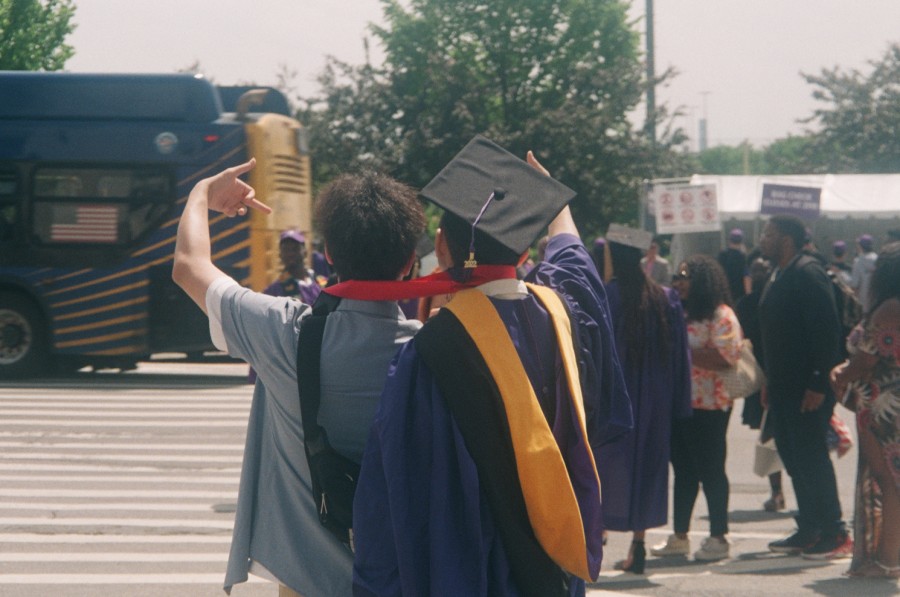Biden student loan forgiveness plan a late first step, NYU students say
President Biden’s student loan forgiveness plan will eliminate $10,000 of individual federal student debt. Some students worry that the policy is not enough.
The Biden administration’s Public Service Loan Forgiveness program may provide relief for NYU students who graduate with student loan debt. (Manasa Gudavalli for WSN)
September 6, 2022
CAS senior Kaylie Barreda owed approximately $13,000 in federal loans prior to the announcement of President Joe Biden’s student debt forgiveness plan. As a Pell Grant recipient, Barreda will be left without debt once the policy takes effect.
“It means a lot,” Barreda said. “Before I came to NYU, the biggest thing is that I was going to regret it — that’s what everyone told me.”
Biden announced his administration’s plan to forgive $10,000 of federal student loan debt for qualifying borrowers and up to $20,000 for recipients of Pell grants — need-based financial awards that do not need to be repaid. The plan, which was announced on Aug. 24, targets middle-class and working-class people and families, specifically individuals earning less than $125,000 per year or households earning less than $250,000.
In the policy, Biden also extended the federal loan pause through Dec. 31, building upon several suspensions of loan payments since the beginning of the pandemic. Federal student loan payments are now set to resume in January 2023.
Although Barreda is grateful that her own debt will be forgiven by the plan, she said that she wishes Biden would have kept his campaign promise of eliminating all student debt for borrowers making under $125,000 annually. On the campaign trail, Biden promised to immediately cancel $10,000 of debt per borrower, and eventually, all loans.
“This is because midterms are coming up, and it is convenient to do it now,” Barreda said. “He’s had four years, and just now we’re getting the scraps of a campaign.”
An LS sophomore who asked to remain anonymous said that although she has not had to take out significant loans to fund her NYU tuition, several of her friends have struggled with paying off their debt. She said that she hopes to see more debt forgiveness from the Biden administration in the future.
“It’s a really great start because this was a big part of his campaign,” she said. “Student loan forgiveness is probably what got him a decent amount of votes from people our age and people who are starting in the workforce.”
According to NYU, the university’s total cost of attendance for the 2022-23 school year is $83,250 for most undergraduate students — around $58,000 of which is made up of tuition expenses and mandatory fees, up $1,668 from the 2021-22 school year. Approximately $25,000 is comprised of room and board and the estimated cost of books, transportation and other personal expenses.
Stern first-year Nived Soman said that he supports student loan forgiveness, but believes it is an insufficient response to a larger problem: the rising cost of attendance at U.S. universities.
“The focus should be more on reducing the cost of college in the first place rather than loan forgiveness,”Soman said. “Eighty thousand dollars is kind of crazy. No college should cost that.”
NYU previously covered around 62% of demonstrated financial need for undergraduate students in the 2020-21 school year — the lowest of any private school with an endowment of over $1 billion, the Wall Street Journal reported. For the class of 2025, the university announced that it would meet the full demonstrated financial need of both domestic and international students. This policy change, which was announced in 2021, increased financial aid packages by more than $11,000 on average since the 2020-21 school year.
Many parents of NYU undergraduate students received direct PLUS loans — unsubsidized federal loans available to parents of dependent students and graduate students — to cover the difference between their financial aid package and the cost of attendance. Parents of NYU Bachelor’s degree recipients took out loans averaging $74,000 in 2018 and 2019, higher than 99% of other four-year universities, according to WSJ.
Barreda said that she felt lucky to only have to pay under $20,000 and avoid PLUS loans, but said that her debt is a fraction of what other students are faced with to attend NYU.
“[Biden] promised all student loan debt,” Barreda said. “Yeah, it’s great for me, but other people have $80,000 to $100,000, and they’re paying out-of-pocket. It’s never going to be enough.”
Contact Kayla Hardersen at [email protected].

























































































































































